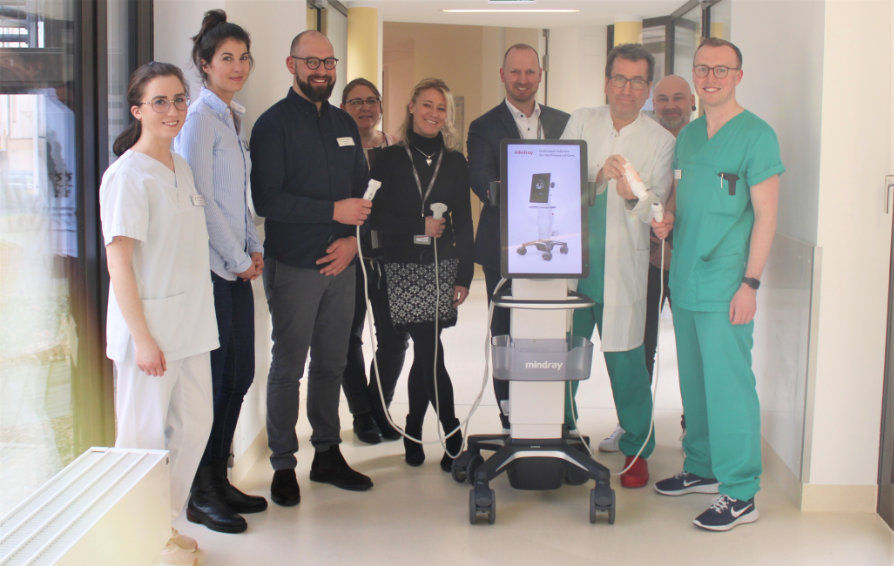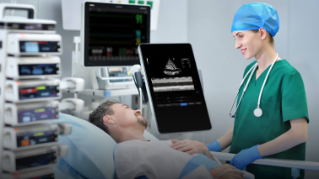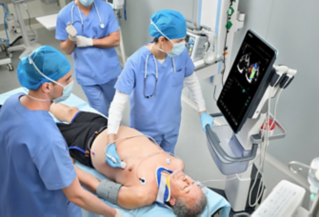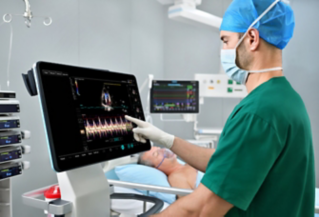The new study adopts an ultrasound-based evaluation system named Venous Excess UltraSound-Score (VExUS-Score), an intensive-care concept where organ flow profiles can be measured via ultrasound without pain to gain information on the degree of water retention in a patient’s body. A non-invasive method, applicable anytime and anywhere, to check the volume status provides immediate information on the risk of excess water retention and harmful dehydration. It serves to avoid a deterioration in renal function and at the same time permits a finer and more targeted therapy control.
Cardiac insufficiency is a frequent disorder primarily affecting the elderly. The pumping performance of the heart is too weak to supply the body with sufficient amounts of blood. Possible consequences are breathlessness, fatigue and water retention in the legs. The proportion of people over 65 in Brandenburg’s population is 25% and thus above average. As a result, Brandenburg has one of the highest hospitalization rates due to cardiac insufficiency in Germany. An interdisciplinary team of researchers and physicians from 4 MHB hospitals is now exploring a new and gentle method to improve the treatment of heart failure. The novel method uses ultrasound for medical imaging of body organs, so that physicians can discover an excess of water retention in the body. Partners in the study are the university hospitals of the Brandenburg Medical School Theodor Fontane (MHB) in Bernau, Neuruppin, Brandenburg an der Havel and the Krankenhaus Märkisch-Oderland in Strausberg, an academic teaching hospital associated with the MHB.
Apart from treatment of the causes of heart failure, the therapy aims to relieve the strain on the heart; diuretic medication helps to discharge excess fluid through the kidneys. There is, however, a risk of overloading the kidneys, with resulting kidney failure in the worst case.

Protection against complications
Prof. Anja Haase-Fielitz, scientific coordinator in the cardiology department of the Bernau Cardiac Center, describes the objective as sustained improvement of patient care: “The key research interest at the MHB is medical care for the elderly. We focus on developing gentle interventions for patients with cardiac insufficiency to protect them from serious complications such as acute renal damage.” Avoiding complications is all the more important since kidney functions are already impaired in many elderly patients. Additional acute kidney damage due to, for example, too fast removal of liquid would involve a high risk of dialysis.
The new study adopts an ultrasound-based evaluation system named Venous Excess UltraSound-Score (VExUS-Score), an intensive-care concept where organ flow profiles can be measured via ultrasound without pain to gain information on the degree of water retention in a patient’s body. A non-invasive method, applicable anytime and anywhere, to check the volume status provides immediate information on the risk of excess water retention and harmful dehydration. It serves to avoid a deterioration in renal function and at the same time permits a finer and more targeted therapy control.
Jonathan Nübel, physician in specialist training and initiator of the study, is highly pleased with backing received from Mindray: “Development and exploration of novel care strategies together with industry partners offer a chance to introduce innovations like ultrasound imaging into the practice of patient care and make statements on therapy strategies more accurate.” Ultrasound measurements at the patient’s bedside are also intended to help determine the optimum time for discharge. This aspect is significant since premature discharge may compromise treatment outcomes. Moreover, the participation of the four hospitals involved ensures a broader data basis.
Association of university hospitals develops innovative research project
Prof. Christian Butter, senior cardiologist at the Bernau Center, perceives the study as a strong message to policy makers: “Our association of university hospitals has joined forces not only to train the next generation of physicians but also to develop innovative research projects. Outstanding dedication of all involved is required to achieve these objectives, over and beyond or obligations in patient care.” Prof. Butter expects the study to provide a comprehensive perspective on the transferability of ultrasound measurements to acute cardiac insufficiency.
MHB president Prof. Hans-Uwe Simon welcomes the close collaboration between university hospitals and institutes and the imminent start of the research project: “Coordinated by the Center for Clinical Studies, the project brings important MHB units – the BIKUS (Brandenburg Institute for Clinical Ultrasound), our Institutes of Biochemistry and of Biostatistics and Registry Research - together with our academic teaching hospitals and associated university hospitals. The association facilitates the targeted use of shared strengths. We are particularly proud that a graduate of our very first cohort of medical students has initiated this project – a clear proof that the MHB encourages future researchers via proactive promotion of scientific careers.”
Further participants in the project are renowned experts like Prof. Christian Jenssen (president, European Ultrasound Federation), Prof. Dieter Nürnberg (former president of that institution) and Prof. Raoul Breitkreutz from the scientific ultrasound network “Point-of-Care Ultrasound in Emergency and Intensive Medicine”.
Data to be collected from MHB university hospitals and a teaching hospital, starting with Bernau.



